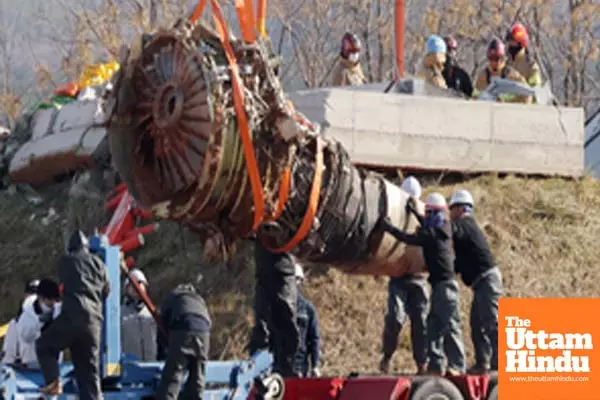
South Korean investigators recover aircraft engine from jeju air crash site

Muan (The Uttam Hindu): South Korea's government investigators on Friday recovered the aircraft engine from the Jeju Air crash as they are focusing on determining the cause of the accident that claimed 179 lives this week. Investigators of the Aviation and Railway Accident Investigation Board have retrieved the engine of the crashed B737-800 from the accident site at Muan International Airport and transported it to a secure location for analysis, according to officials. The government is also working to recover the tail section of the aircraft. Authorities briefly halted the process after blood traces were discovered inside the fuselage. Officials plan to determine whether the blood belongs to a passenger or an animal, such as a bird, through detailed forensic analysis. Additionally, work on converting the audio from the cockpit voice recorder into text is nearing completion, officials said.
The aircraft's Flight Data Recorder (FDR) was found to be partially damaged, making data extraction impossible on-site. Officials plan to send the FDR to the US National Transportation Safety Board in Washington for analysis on Monday. Separately, authorities have begun the process of returning victims' personal vehicles to their families, with applications being accepted from relatives, Yonhap news agency reported. Digital forensic analysis is also being conducted on 107 mobile phones recovered from the crash site under the consent of the families. Investigators are hoping the analysis might yield critical information that might shed light on the in-cabin situation just before the crash. Meanwhile, Jeju Air Co. on Thursday said it planned to reduce flight operations as early as the following week in response to growing concerns over the safety of flights operated by the leading low-cost carrier after this week's fatal crash. Song Kyung-hoon, head of Jeju Air's management support office, said during a press briefing that the company was "preparing to implement reductions in domestic flight operations as early as next week and for international routes starting in the third week of this month." The apparent landing gear malfunction of the crashed Jeju Air B737-800 aircraft on Sunday raised concerns that the airline might have prioritised operations over sufficient maintenance time, potentially compromising safety, according to Yonhap news agency. The plane involved in the crash, which claimed 179 lives, had operated 13 flights in the 48 hours prior to the incident. Previously, Jeju Air had announced plans to cut flight operations by 10-15 per cent by March to enhance operational safety. When asked about a potential liquidity crisis caused by a wave of ticket cancellations, Song acknowledged that cancellations had increased compared to the past, but new bookings were still coming in. Regarding emergency financial support for the families of victims, Song said Jeju Air had been exchanging opinions with the families about methods and procedures.

